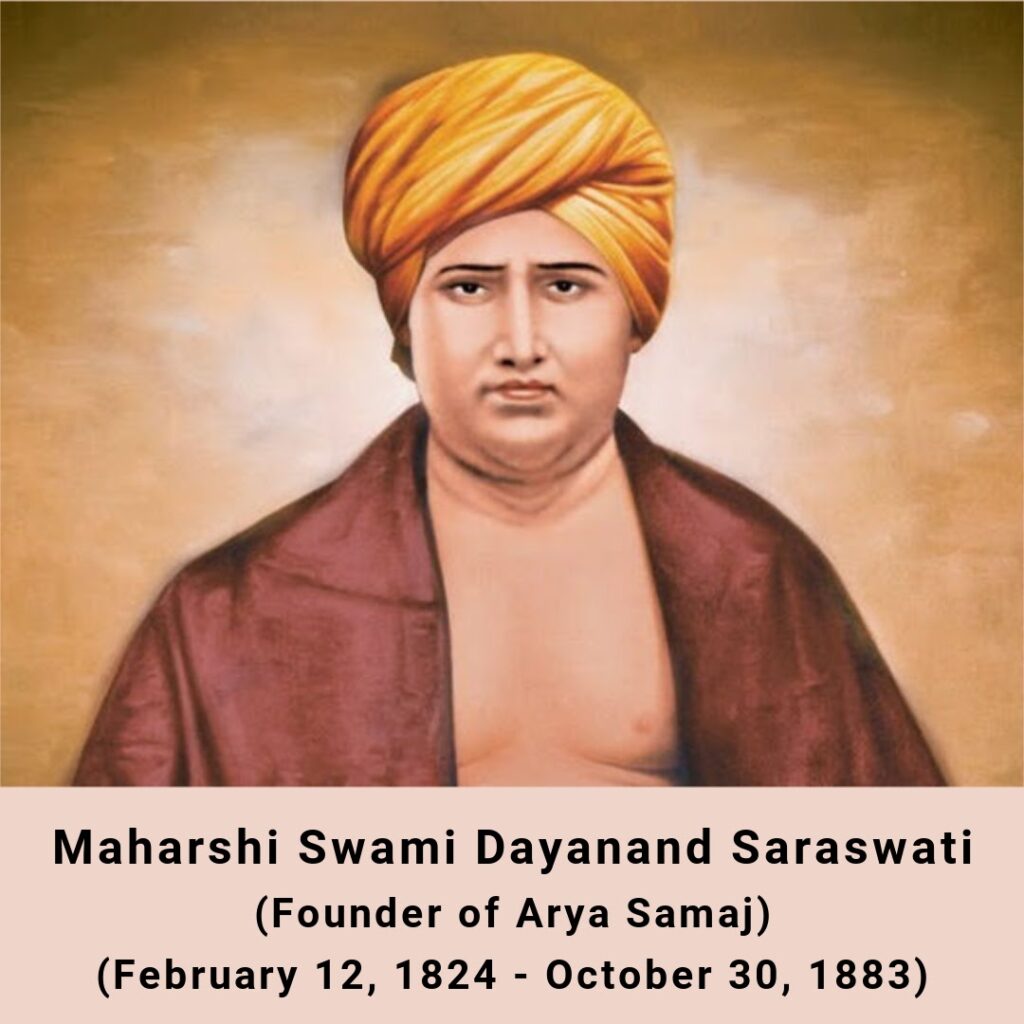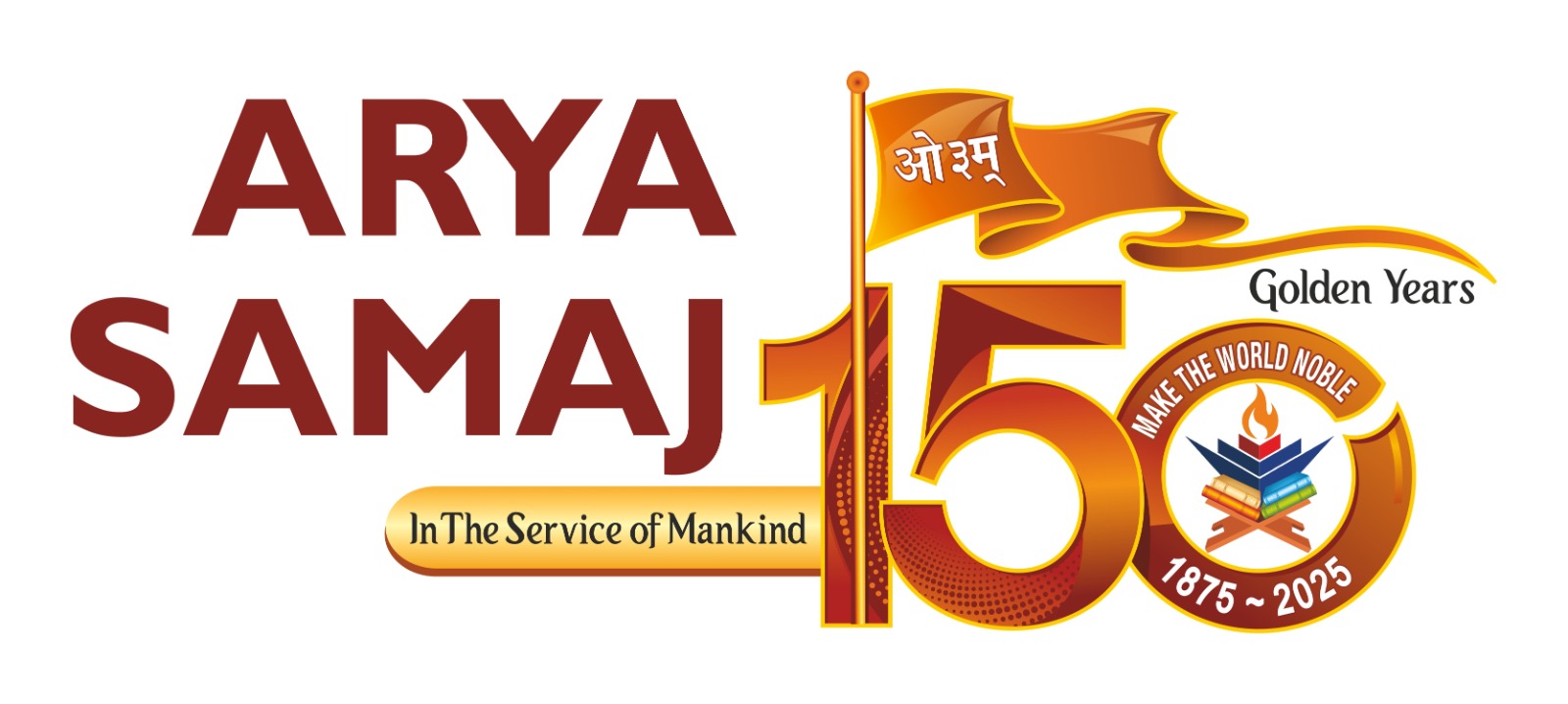
Maharshi Swami Dayanand Saraswati (1824-1883)
“Back to the Vedas”. This was the clarion call of Swami Dayanand Saraswati, religious leader, social reformer, gifted speaker and prolific writer. In 1875, Swamiji founded the now global fellowship of the Arya Samaj. His writings include commentaries on the Rig, Yajur and Sama Vedas, an encyclopedic work on Hinduism called Satyaarth Prakash, a book of prayers and a work on Sanskrit grammar. Swami rejected idol worship and polytheism. He fought against superstitions, child-marriage, the hereditary caste system and forced widowhood. He advocated women’s education, cow protection, a single national language – Hindi and the study of Sanskrit. He made it clear that politics – Danda Niti – was an essential part of the national life of the people who must work for self rule – Swarajya.
Born in 1824 in Tankara Kathiawar (now in Rajkot district of Gujarat), Mool Shankar, (the original name of Swami Dayanand) was born in a Shaivite family. At the age of 14 while fasting on the night of Shivratri in the temple he was startled when he saw a rat climbing the Shivling and eating the offerings. It created doubts in his inquisitive mind about the real God and the yearning for true knowledge seized him. The sudden death of his sister and uncle also had a tremendous impact on him in his quest for truth. He left his father’s home at the age of 21. He wandered the country for 20 years and learned the Vedas from scholars. His Guru, Swami Virjanand of Mathura, the blind saint with a giant intellect, gave him his mission. Swamiji died at Ajmer on October 30, 1883, having been poisoned.
Maharshi Swami Dayanand, founder of the Arya Samaj was one of the very few great-enlightened men of the world who sacrificed everything for the emancipation of mankind. He was a great scholar, a yogi, a philosopher, a social reformer, a great orator and a foremost political thinker. Born in affluence and luxury, he left home when forced by his parents to get married and he wandered in the Himalayas in pursuit of knowledge and truth. Facing hardships, difficulties and resisting all temptations, he studied the ancient scriptures, particularly the Vedas which he regarded as a source of Divine knowledge and engaged himself in the Herculean task of spreading that knowledge. Swami Ji believed that Dharma is the following of truth which alone triumphs ultimately, and secures “Dharma, Artha, Kama and Moksha” for all devotees. Maharshi Swami Dayanand said “The man who resolves to stick to truth at all costs, steadily rises in virtue. When his virtues raise his reputation and prestige, he becomes even more a devotee of Truth. This devotion to truth becomes an unerring source of power and greatness”
Truth, according to him, was not only conformity in word thought and action “but also propriety of ideas in connection with real matters”. In his Satyarth Prakash (Light Of Truth) Swami Ji lays down certain criteria to judge what truth is. These criteria include whether the subject was in conformity with the teachings of the Vedas, nature, attributes and characteristics of God; whether it was in harmony with the practice and teaching of the Aaptas, the pious, truthful, unprejudiced, honest and learned men. Whether it was in keeping with the purity and conviction of one’s own self or whether it stood the test of direct perception, inference, analogy, testimony, history, deduction, possibility, and negation. It was indeed his love of Truth that drove him to make a comparative study of the religious practices and pass judgments on their merits and demerits. As he himself said, “My sole aim in criticizing the view of others is to arrive at the truth”. There was no bitterness in his heart, no malice even for his critics. On the other hand his heart was so full of love and sympathy for all that he pardoned the man who poisoned him to death. He advocated reconversion of converted Muslims and Christians to their original faith. He held many Shastrarth (open debates) with Christian missionaries, Muslim maulvis, and Pauranik pandits all over the country with a view to removing dogmas, superstitions, rituals, idol worshiping and other evil practices then prevailing in Indian society in the name of religion.
At times his defeated opponents tried to assault him. He however, carried on his mission undaunted and without fear. To a well-wisher he once said “it is not man that guards me but the great Lord who protects me everywhere. Don’t be anxious about my account.” Swami Ji maintained that a man’s salvation lies in following the teachings of the Vedas, which he considers the revelation of God. The teachings of the Vedas are infallible because God who revealed them to the Rishis, is Perfect. Maharshi Dayanand had imbibed in himself the feeling of nationalism and patriotism. The part played by him and his disciples and followers reflects the revolutionary zeal in the blood of Maharshi Dayanand. He had an association with the rulers of the different states. His influence over the Maharajas of the states of Bharatpur, Raipur, Udaipur, Shahpur and Jodhpur is quite well known and adds a lustrous chapter in the history of Arya Samaj and India’s Independence struggle.
As a social reformer, he waged an eternal war against evils like idol worship, untouchability, child marriage, and Sati-Pratha. He preached that having a dip into the sacred water of the Ganges cannot absolve a person of his sins. One has to bear the consequences of one’s sins, as God who is just – is not easily beguiled by such rituals. He also attacked the theories of Saakaarvad (incarnations) on the ground that God is all supporting and formless. He removed the misconception among the Hindus that shudra and women had no right to study the Vedas. He tried to break all barriers to caste, creed, color and sex which separated man from by propagating the doctrine of the universal brotherhood based on the assumption that God is the creator of all.
On the educational level, he strongly advocated women’s education and a return to the Gurukula system of education. Even though his mother tongue was Sanskrit and Gujarati, he switched over to Hindi and advocated its acceptance as the language of India. He maintained that one’s action and not sheer birth determines one’s Varna. He prescribed the duties of each Varna – Brahmin, Kshatriya, Vaishya and Shudra in conformity with the teachings of the scriptures and the Vedas. He also divided a man’s life into four stages and taught the respective duties and obligations of each ashram in addition to formulation of a common code of conduct formally. The four ashrams, according to him, were Brahmacharya, Grihasta, Vanaprastha, and Sannyasa.
Realizing that Indian society’s main drawback is its disunity and division, he gave a call for one God – OM, one religion – Vedic Dharma, one language – Hindi, one caste – Arya and one method of worship – Sandhya. To ameliorate a lot of the suffering humanity, he founded an institution which he named as Arya Samaj. ‘Doing good to the whole world’ he said, is the primary object of this society, i.e., to look after its physical, spiritual, and social welfare.” Among the ten principles enunciated by him for the Arya Samaj are: A famous historian, Dr.J.N.Sarkar says “He is a true statesman”, ”who can legislate for the future, who can set a force at work which will go on influencing the lives and thoughts of unborn generations. When the history of India’s growth comes to be written, that high rank will be judged to the ‘naked Fakir’, “Dayanand Saraswati”.
As a nationalist, Maharshi Dayanand was courageous and outspoken. He never feared the mightiest in expressing what he considered to be true and correct. North Brooke, the British Viceroy of India in 1873 wanted appreciation and praise of the British rule and administration in India in the speeches of Maharshi Dayanand Saraswati, Maharshi Dayanand categorically told him that twice daily he prayed to God to liberate India from foreign rule and he wanted to see India, fully independent as soon as possible. “One should always be ready to accept the truth and give up untruth”. “One’s dealings should be regulated by love and justice in accordance with the dictates of Dharma”. “One should promote knowledge and dispel ignorance”.
We are introducing to the public the life and teachings of this great Rishi with a hope that it will inspire readers to emulate his example and follow the path of truth. We are sure that following his path, humanity can certainly overcome pain and suffering and enjoy the Divine bliss and happiness which are being sought by everybody. He saw ignorance as the root cause of all miseries. This he thought consisted in regarding impure things as pure, painful things as pleasure giving, mortal things as immortal. Emancipation depended on removal of this ignorance. There is no emancipation as long as ignorance persists. For the first time in history, He asserted and proved that there was no Monism but Trinism in the Vedas. He showed through apt quotations from the scriptures that God, soul and matter were different attributes.
